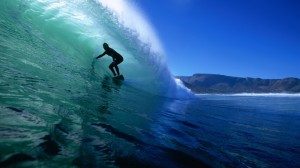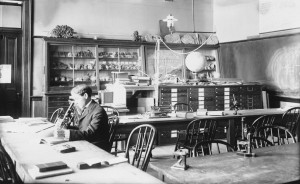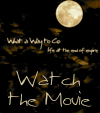There are none so blind as those who will not see.
John Heywood
I used this quote above (attributed to Heywood but echoing “Jeremiah 5:21,” which designates some small portion of copy from a book that the religious group “the Christians” refer to as “the Bible.”) in the “front matter” of my first novel, All of the Above. It’s a quote that shows up later in the book, spoken by one of the characters. And the phrase “none so blind” has been my working title for the series as a whole, as in: All of the Above, Book One of the None So Blind series, soon to be a major motion picture. (That last bit is one of those thoughts-create-reality experiments…)
I didn’t use that series title anywhere on the book’s cover, though there is a note in the back, just after the story ends, that explains that All of the Above is the first book in a series of three. One reason for not using it on the cover, or elsewhere in the marketing copy, is that, with only a first book, there really isn’t a series yet, just an intention, and that it might be misrepresentative to advertise it as such. I could, after all, simply drop the whole thing and move onto something else. Such things have happened before.
But another reason to not use that title is that Sally had misgivings about it. Sally’s a compassionate sort, you see, and shies away from making unbalanced judgments about people whenever possible. To her, Heywood’s quote judges people’s “not seeing” as a matter of will, and fails to take into account the situation into which they were born and raised that would have them “not see” something.
Okay. I get that. Sure. There’s a great deal of judgment in the world. And most days, at least when viewing the larger society through the various media, it feels like there’s much less compassion. Doomers™, perhaps, are especially prone to playing the “you just don’t get it” card, speaking of “the masses” as “sheeple,” battling “denialists,” and thinking we live in the “age of stupid.” I often find a certain condescending, contemptuous tone amongst those who can more clearly see the present global predicament toward those who don’t.
I’ve indulged in that tone myself from time to time. But mostly I remember my own long decades spent living right inside the dominant paradigm, even if I had scootched over to the edge as much as was possible. Unable to forget my own journey, it has always made sense to me to balance my frustration and judgment with understanding and compassion, and I relax when I see other Doomers do that. Sure. We’re most of us™ having trouble seeing some seemingly obvious things. But there are really good emotional-psychological-cultural-spiritual reasons for that. I know how long it took me to claw my way out of that set of assumptions, beliefs, expectations and values. It’s not been easy. I get why most people never seem to get around to it.
But to me, the quote doesn’t really judge all “not seeing” as willful so much as point out that, on the continuum of people’s ability to “see” our current collective predicament, the blindest ones are those who are in some sense choosing not to see. And I think it’s those who fall closer to the willful end who are actually in that thing we call Denial™. Not knowing is not the same as denial, I think. Being mis- or poorly-informed is not denial. And I know for myself that my journey included a great deal of both “not knowing” and being “misinformed.”
But denial is different. To my mind, you cannot deny something without first seeing, sensing, or knowing it. Denial includes a “turning away,” which feels more active and willful than the more passive “not knowing” or “being misinformed.” And because the “not seeing” is active, it feels much more difficult to “break on through” to clarity and knowing. It’s the blindest form of “not seeing,” as Heywood says.
Now we can consider that this active “turning away” is completely understandable, and that it may rarely be conscious. And if it’s not conscious, we can wonder if it’s really willful at all. Sure. Good thing to wonder about. But I find that neither the victim story nor the perpetrator story captures the full reality of my experience, and that I must take on and balance both in order to understand my own journey. While I can lay claim to not knowing and being misinformed, I must also state that, at some point, my victim’s claim of “I didn’t know” became more and more indefensible. Facts and figures pounded on my wall of “not seeing,” and vague rumblings touched my heart and filled me with fear. As a highly sensitive soul living in a well-attuned physical body, there were deep parts of me that “knew” long before my rational mind could accept what I knew. It took active energy, will, to not let fully into my consciousness what my body and soul already knew. And, as I was not consciously choosing to not know what I knew, it took further energy to hide my own denial from myself. Which is why I’ve felt so much relief from opening up fully to the world situation. Denial had sapped me of my strength.
At this point, given the “information society” in which we live, and given the ramping up of the severity of our various Problems™, the vast majority of civilized humans probably now stand, poised like surfers, somewhere on the middle of that continuum of “seeing,” with at least one foot firmly settled on the “willful” end of the board, just as I stood for so long. Though there’s still a great deal of misinformation out there, there are likely very few who can honestly claim that they have not sensed or heard about the present global predicament, and the tsunami of Earth changes and societal changes now headed in their direction. To me, it’s perfectly understandable that it should be this way, as the present predicament spells the end of our current way of life, and perhaps the end of most of life itself (making it, therefore, Disturbing™ and Frightening™ for most), and this “turning away” may be rooted primarily in an assessment, perhaps quite reasonable, that there’s really nothing much most people can do about this predicament in any event, a possibility that was movingly illustrated in this scene from Deep Impact in which the young reporter stands on the beach in the arms of her father as the wave approaches:
Heywood’s quote, then, just feels to me like an accurate statement of what’s so, and the “new” thing here might be that one can question one’s acculturated judgement that willful Denial™ is Bad™. This is the assumption that would make Heywood’s observation “judgmental,” after all, and, as everyone knows, judgmental is a Bad™ thing to be. Denial may be a perfectly reasonable way for many to surf the coming storms. It just might be difficult to ponder that possibility inside of the belief that Collapse™ is Bad™ and that there is Something We Can Do to Stop It™. Maybe Collapse is not Bad™, maybe there isn’t much we can Do™ (apart from aligning with what is already happening), maybe both beliefs to the contrary stand in the way of something important, and maybe Denial™ does have an important role to play right now. I can tout the spiritual benefits of facing fully into the shitstorm, but all I really know is that that’s the path that works for me. As much as it confronts my reactive ego to say so, others may be operating out of very different, and possibly useful, wisdom. Denialists™ in every field (including some now asking for your vote) may be “leading the charge” to “hit bottom.” Active, willful blindness may actually help civilized humans achieve more quickly what it is they most seem to want, which is to unravel the present society in which they feel trapped, lost, and miserable. And ending that system as quickly as is possible may be Life’s only real hope.
I do not know this to be True™. I am simply open to considering the possibility. It certainly feels like a high-risk strategy. But in this time of seemingly Insoluble Problems™, we may have little choice in the matter, at least if we are entertaining any hope of continuing on in the physical realm.
If denial will help us stop this crazy machine, then here’s to it.
Surf’s up.
Addendum: When I started this piece, all I really knew was that I wanted to take on that John Heywood quote. I didn’t know where my musings would take me. And I didn’t realize, until the next morning, that those musings would help me break through a stuck place in my current writing, which is Rumi’s Field, the sequel to All of the Above. Wonderful, how everything connects with everything else…









